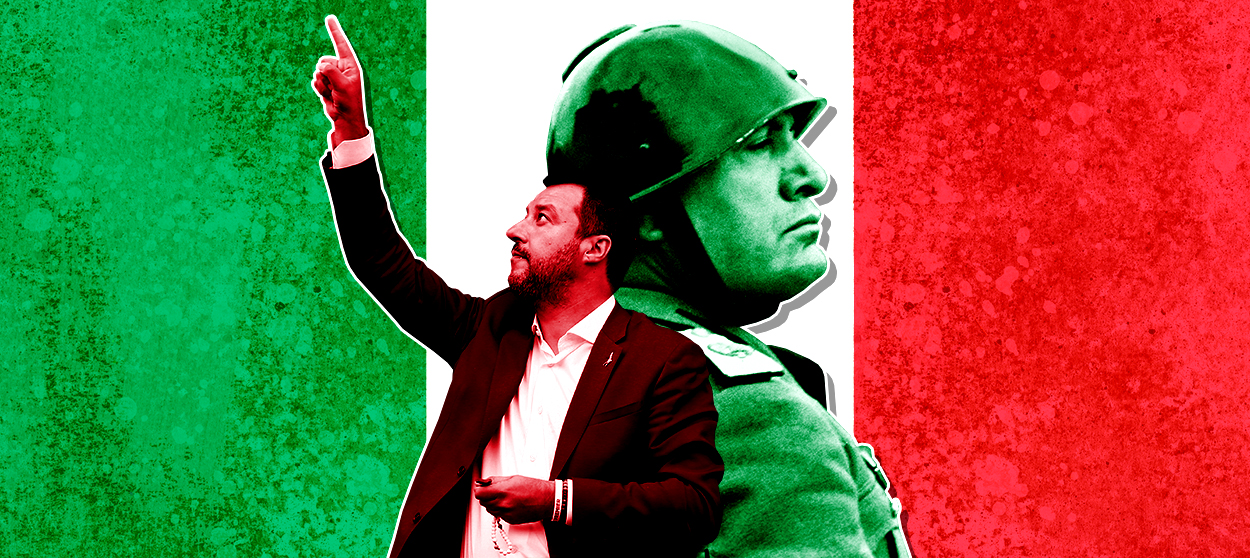Mussolini's 21st-century clone is leading the far right to victory in Europe
Matteo Salvini is following Il Duce's playbook by coopting the rhetoric of the left


A free daily email with the biggest news stories of the day – and the best features from TheWeek.com
You are now subscribed
Your newsletter sign-up was successful
Matteo Salvini is often compared to fascist dictator Benito Mussolini by his critics, and for good reason. Italy's Interior Minister and Deputy Prime Minister, who led his far-right party Lega or League (formerly Northern League) to a resounding victory in the European parliamentary elections this past weekend, gaining 34 percent of the vote compared to a mere 6 percent in 2014, is the undisputed face of the far-right nationalist surge in Europe.
The 46-year-old politician's nationalist rhetoric is eerily similar to Mussolini's and, like the 20th-century dictator, Salvini is fiercely anti-liberal, misogynistic, and instinctively authoritarian. He also shares an interesting biographical similarity with the founder of fascism: like Mussolini, Salvini started out his political career on the far-left before becoming the de facto leader of Italy's far-right. Indeed, until just a few years ago Salvini maintained in interviews that his old left-wing politics still shaped much of his worldview, and that he related to the "classical themes of the left."
"I certainly feel more left-wing than [Former Prime Minister Matteo] Renzi," he said in 2015. “I'm an old-fashioned communist, I know more factories than bankers do.” In 2013, he similarly commented that he saw more "leftist values" in the European far-right "than in some left-wing parties." Right-wing populist parties and movements, he went on, "are those that today defend workers, those who lead right battles."
The Week
Escape your echo chamber. Get the facts behind the news, plus analysis from multiple perspectives.

Sign up for The Week's Free Newsletters
From our morning news briefing to a weekly Good News Newsletter, get the best of The Week delivered directly to your inbox.
From our morning news briefing to a weekly Good News Newsletter, get the best of The Week delivered directly to your inbox.
Like Il Duce, who styled himself as an "authoritarian" and "aristocratic" socialist while still on the left, Salvini has clearly always been an authoritarian at heart, and it is worth recalling that early fascist movements in Italy and France were originally made up of right-wing nationalists and non-conformist leftists who wanted to destroy the liberal democratic order more than anything else.
A leading scholar of fascism, Robert Paxton, notes in his book The Anatomy of Fascism that, amid their murky and at times contradictory ideology, fascists were clear about one thing: they were not in the middle. "The ultimate fascist response to the Right-Left political map," writes Paxton, "was to claim that they had made it obsolete by being 'neither Right nor Left,' transcending such outdated divisions and uniting the nation."
"The fascist movements — all the fascist movements — had the same lineage: a revolt against liberal democracy and bourgeois society," observes the Israeli historian Zeev Sternhell. "A classic ideology of rejection," he adds, "fascism implied the repudiation of a certain political culture associated with the eighteenth century and the French Revolution."
Salvini and his far-right allies throughout Europe share this kind of attitude, often claiming that the traditional left-right dichotomy is antiquated and that they represent a new kind of politics for the 21st century that looks to the future instead of the past. At a rally in Milan that was attended by right-wing nationalist leaders from across Europe one week before the election, Salvini declared that there were no "extremists, racists, or fascists" at the rally, and that, "If anything in Italy and in Europe, the difference is between who looks ahead, between who speaks of the future ... instead of making trials of the past."
A free daily email with the biggest news stories of the day – and the best features from TheWeek.com
It's not hard to see why Salvini would prefer people forget history, and the clear parallels it suggests; Caio Giulio Cesare Mussolini, the fascist leader's great-grandson who also won a seat in the European Parliament on Sunday, has called himself a "post-fascist," and has also asked Italians to "look forward."
The sworn enemies of today's "neo-nationalists" are ultimately the same enemies of 20th-century fascists: liberal cosmopolitans and "do-gooder" elites who are deliberately undermining "Western civilization" (or Germanic, Italian, French, etc.) with their "globalist" ideology. While 20th-century fascists railed against "rootless cosmopolitans" and international bankers who were subverting the nation, in Milan last week Salvini accused European leaders like German Chancellor Angela Merkel and French President Emmanuel Macron of "betraying Europe" in their effort to construct "a Europe of finance and uncontrolled immigration."
Another glaring similarity between 21st-century nationalists like Salvini and 20th-century fascists like Mussolini is their natural ability to work crowds and exploit popular discontent. Fascism was the first political ideology to truly grow out of the mass politics of the modern age, and Mussolini, thanks in part to his early career as an activist and organizer on the left, understood mass politics better than most political leaders at the time (especially those on the traditional right). The Italian dictator was well-versed in the works of writers like Georges Sorel (who famously argued that "myths" were necessary for any kind of successful popular movements) and Gustave Le Bon, whose theory of the "popular mind" compared the psychology of crowds to the psychology of "primitive beings" governed wholly by "unconscious considerations."
"[To] control the masses," Mussolini once wrote, "it is necessary to employ two levers: enthusiasm and interest. Whoever utilized but one of the two runs grave risks. Mystic commitment and political concerns condition each other. The one without the other is arid; enthusiasm without a concern for interests loses itself in the fluttering of flags."
While it's unclear if Salvini is familiar with the theories Sorel or Le Bon, he clearly has an intuitive grasp of mass politics and understands the importance of building popular movements, which may also stem from his leftist beginnings. He certainly has a far better understanding than someone like Emmanuel Macron, who has been presented by media observers as the last bulwark against right-wing nationalism, The French president has come to look increasingly impotent in the face of right-wing populism since he was elected two years ago, and on Sunday his party suffered a devastating loss in the elections to Marine Le Pen's far-right National Rally (formerly National Front).
If Macron is indeed the last hope for European liberalism, then the European project is in deep trouble. Like fascism in the early 20th century, the rise of right-wing nationalism today is a direct response to the crisis of liberalism and capitalism that has overtaken the planet (and, unlike the 1930s, capitalism is truly global today). One of the fundamental reasons why fascism was held in check in countries like the United States and the United Kingdom during the 1930s was because their liberal governments and leaders adopted policies that were fairly radical for the time. In America, Franklin Roosevelt not only put forward the New Deal to deal with the Great Depression and the encroaching threat of both fascism and communism, but spoke the language of populism, calling out "economic royalists" and welcoming the hatred of organized money. In contrast, today's liberals seem utterly incapable of confronting and dealing with the crises created by liberalism and capitalism — it is almost impossible to imagine someone like Macron or Joe Biden welcoming the hatred of organized money and denouncing capitalists as the "old enemies of peace."
Thus, the left now looks to be the only real hope to defeat right-wing populism (or neo-fascism, if we're being honest). But Matteo Salvini could have told you that.
Conor Lynch is a freelance journalist living in New York City. He has written for The New Republic, Salon, and Alternet.
